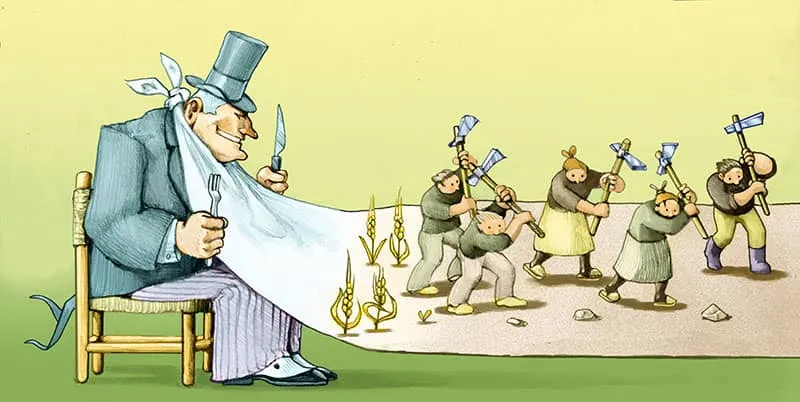What Does Giving Mean?
We were given the phrase “Capitalism begins with giving,” and were asked to define giving in the context of the phrase. Giving could mean giving up power, giving money, or giving advice, but in this instance, giving means giving a “gift” of sorts. In the video, it was mentioned that capitalism was derived from pot latching, which was the action of the giving and receiving of feasts between tribes/families. From there, people would then give gifts in exchange for other gifts, and thus trading and bartering systems were born. From trading, we then moved to a monetary system, and modern capitalism was born and here to stay. But, historians still argue about the psychological reason for beginning the gift-giving cycle; some believe that it was born of greed because they wanted to have leverage and get things in return, and others thought it was from sympathy because it is human nature to want to please and give to others who are in need.
Sympathy vs. Greed
Sympathy and greed are on the opposite ends of the spectrum when it comes to personal reasons for doing something. In the case of capitalism and giving, it can be even harder to specify which one it is. In chapter three of Wealth and Poverty, Gilder tries to make a strong case that sympathy and good intentions were the reason for giving and the bases of our capitalist society. However, I greatly disagree. Even in pot latching, gifts were given to make the recipients drop their guard so they could attack after offering what was thought to be a sign of peace, which is by no means sympathy or good intentions. When the trading system was implemented, people would trade away goods they did not use or did not want to get something better for themselves, which is personal gain. “But they were giving to someone who needed it more which is noble,” no, they were trying to gain something for themselves, which is the whole reason to trade. In our modern day capitalist society, it is all about personal gain when companies set prices and wages, making sure they create the best possible outcomes for themselves. Nonprofits are where people who want to be sympathetic and have good intentions go for the sake of being good and expecting nothing in return. The chapter also talks about making investments and investing money, which are just personal “gifts” made in the self interest of gaining money with no work being done. Even if you are investing in someone else, it is still out of personal gain to see them succeed and grow because then it was an investment well made and not a failure.
Root of Capitalism
Everyone likes to joke about capitalists being money hungry jerks, but in reality, they kind of are. They make decisions out of self interest, which comes across as rude or selfish, with little to no thought about how it may affect everyone else, and most of the time they might not even realize it. Capitalism is rooted in greed and self interest, no matter what type of examples others may give to say otherwise. Gift giving for the sake of giving the gift is not capitalism, it is nonprofit and charity, which is sympathetic and of good intentions. Gift giving and expecting something in return is capitalism because of the entitlement and selfishness. However, that is not to say that all capitalists are selfish jerks, they only treat competitors and money markets with those types of manners, because that is what it takes to survive in a free market. In chapter three, there is a line that states “one does not make gifts without some sense that one will be rewarded,” which perfectly sums up true human nature and the exact reason as to why capitalism and gift giving will always be greedy and out of personal gain.
Closing Thoughts
I found it funny that throughout the entire chapter three, while Gilder was trying to list reasons as to why capitalism comes from sympathy and selflessness, each case can be made into a personal gain case and there was no definitive example to say otherwise. Human nature and the idea of survival of the fittest make selflessness almost impossible because it goes against the very nature of the body to do whatever it takes to survive and be the last one standing. It can be done; however, it has to be meticulously planned and fought for without letting instincts and the subconscious take over. This is not meant to be pessimistic in any way, only to be a realist; every individual always has something to gain out of every decision they make in life, and the birth of capitalism is the perfect example.
